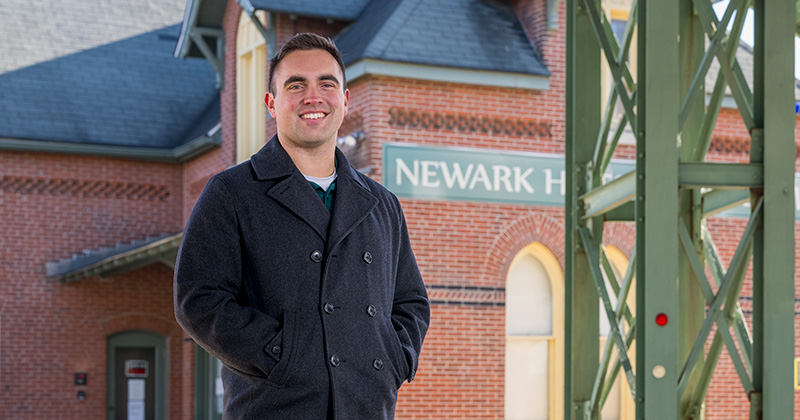


Project Management Certificate course has real-world impact
Photo by Kathy F. Atkinson January 18, 2024
UD alumnus Jeffrey Martindale puts his project management skills to work for the City of Newark
When University of Delaware alumnus Jeffrey Martindale became the chief procurement and projects officer for the city of Newark, he turned to UD Professional and Continuing Studies (UD PCS) to find the project management training he needed to handle his diverse portfolio of responsibilities.
"No day is the same in the city manager's office, and you have to be prepared to be a utility player and to do multiple jobs at once," he said. "Whether I'm working on procurement, facilities maintenance or sustainability projects, we have to achieve the best results in the least time for the lowest cost — that's where project management comes in."
“You learn a lot from actually doing the work,” Martindale continued. “But you can still have gaps in your approaches, and you won’t necessarily see better ways to achieve your goals if you’re in a vacuum. Rather than approaching problems with ‘this is the way I’ve always done it,’ I'm trying to keep up with best practices.”
Martindale credits Ryan Crawford, UD PCS Project Management Certificate instructor, with providing a fantastic explanation of a variety of tools that he was able to use quickly on the job for the benefit of Newark.
“For example, correctly using Gantt charts for projects that impact multiple departments has been very helpful in sharing schedules in a digestible way across a broad spectrum of employees,” Martindale said. “Similarly, RACI charts, or Responsibility Assignment Matrices, have been instrumental in determining who needs to be looped in on project details, and when. In local government, employees’ time is always at a premium and knowing detailed schedules in advance and when to loop folks in significantly cuts down on wasted time, which yields more efficient governance.”
Since earning his master of public administration degree from UD’s Joseph R. Biden, Jr. School of Public Policy and Administration in 2019 and going to work for the city of Newark, Martindale has completed projects that include transitioning Newark’s vehicle fleet to electric where feasible, making Newark’s facilities safer and more accessible, and finding grants to limit taxpayer burden in the city’s budget. He feels the restoration of the historic 1877 Newark Passenger Train Station on South College Avenue is a great example of how project management tools can have a real-world impact.
This nearly 150-year-old building houses the Newark History Museum and its collections. Returning it to top order will require extensive structural work like replacing the roof and repairing architecturally unique windows, at a cost of $700,000.
“The Newark Train Station holds a great deal of Newark’s history dating back to the 1800s. While its functional place in the city has been reduced in recent years, we must retain its history for generations to come,” Martindale said. “Construction plans and timelines are fairly easy. The harder part for this project was building buy-in from the community and the state to get the funding we needed.”
Project management recognizes that projects are unlikely to succeed if both internal and external partners are not effectively engaged: A stakeholder analysis is the first step in understanding the web of relationships that could impact success. Understanding stakeholder needs follows, then early engagement with communications tailored to specific audiences, management of expectations and adapting approaches as the project progresses.
"I often tell my project management students that projects are like snowflakes. Snowflakes have common elements of cold air, moisture and atmospheric pressure, but no two are quite alike,” Crawford said. “Similarly, all projects have common elements of schedule, scope and budget, but no two are quite alike and shouldn’t be managed as such. It’s best to use your fundamentals and adapt them to best fit for your project's needs versus a one-size-fits-all approach. And especially in the case of Jeff’s project, it’s important to know your audience and perform exceptional stakeholder management. It’s great to see adaptation of tools and techniques deliver project value for the city of Newark."
Martindale sees a strong partnership with the Newark Historical Society as a critical outcome of the train station project.
“We’re very grateful to the Newark Historical Society,” Martindale said. “They were instrumental to the project with letters of support to the state legislature that really moved the needle positively and allowed us to get the state funding we needed to do the renovations we needed at the train station. And they’ve also done a lot of fundraising to help us keep the building in shape moving forward.”
Are you ready to become a project manager?
The next live-online course in the UD PCS Project Management Certificate program starts Feb. 7 and ends April 10. The program is designed for people new to project management and people who want to formalize their work experience. Participants learn foundational skills and earn contact hours needed to apply for a Project Management Institute (PMI) certification exam. Course participants can also earn professional development units (PDUs) for maintaining credentials.
Contact Us
Have a UDaily story idea?
Contact us at ocm@udel.edu
Members of the press
Contact us at 302-831-NEWS or visit the Media Relations website

